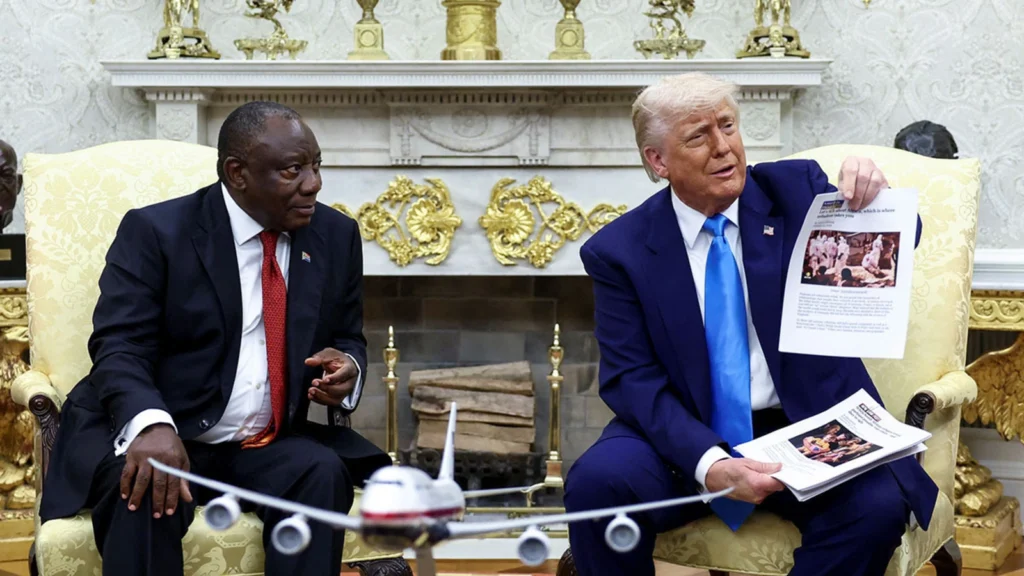Divisive Reactions Follow Trump’s Confrontation with Ramaphosa
In a dramatic exchange at the White House, former President Donald Trump confronted South African President Cyril Ramaphosa, launching allegations of widespread persecution against Afrikaners. This moment has sparked a mixed response among South Africans, revealing deep divides within society regarding issues of race, governance, and international optics.
Trump’s Claims and Ramaphosa’s Response
Trump’s surprising tactics included showcasing videos of opposition leader Julius Malema, who is known for singing the controversial “Shoot the Boer” protest song, which has become a focal point in discussions regarding racial tensions in South Africa. The meeting was characterized by an intense dialogue where Trump accused the South African government of failing to protect its white farmers, a claim that many in South Africa view as exaggerated.
During the encounter, Ramaphosa maintained a composed demeanor, countering Trump’s assertions by emphasizing that South Africa is a democratic nation where diverse political opinions, even those that challenge the status quo, have their place in the political landscape.
The Afrikaner Right’s Celebration and South African Criticism
Right-wing Afrikaner groups, such as the Solidarity Movement, lauded Trump’s intervention, suggesting it brought South Africa’s pressing issues onto the global stage. Leading figures within these groups expressed their gratitude towards Trump, with one commentator stating that he deserved a Nobel Prize for raising awareness about the so-called farm murders in the nation.
Conversely, substantial criticism arose from various South African segments who believe that lobbying foreign powers for intervention undermines national integrity. Critics argue that South Africa consists of a coalition government representing multiple racial and ideological groups, all of whom are collectively striving to address pressing national challenges, such as high unemployment and escalating crime rates.
A Display of Political Unity—or Division?
The South African delegation included notable figures across the racial spectrum, including John Steenhuisen, the white leader of the Democratic Alliance. Steenhuisen acknowledged the nation’s safety issues but dismissed the narrative that most white farmers were fleeing the country, asserting instead that many wished to continue their agricultural contributions.
Both Ramaphosa and Steenhuisen emphasized the necessity of global partnerships to address South Africa’s difficulties, attempting to project a united front amid an uncomfortable encounter.
Table: Key Points of the Trump-Ramaphosa Exchange
| Aspect | Details |
|---|---|
| Trump’s Claims | Accusations of persecution against Afrikaners, and an emphasis on farm murders. |
| Ramaphosa’s Defense | Stressed South Africa’s democratic nature and the right of various parties to exist. |
| Response from Afrikaner Groups | Many celebrated Trump’s actions, seeing them as a validation of their concerns. |
| Criticism from South Africans | Accusations of disloyalty for seeking foreign intervention to address local concerns. |
A Nation at a Crossroads
The tense encounter between Trump and Ramaphosa reflects the complex reality of South Africa. As the country strives for unity in a diverse social landscape, contentious narratives continue to challenge the nation’s quest for reconciliation and growth. With many citizens feeling polarized over the implications of Trump’s statements, the road ahead necessitates careful navigation through the intertwined issues of race, politics, and international relations.


